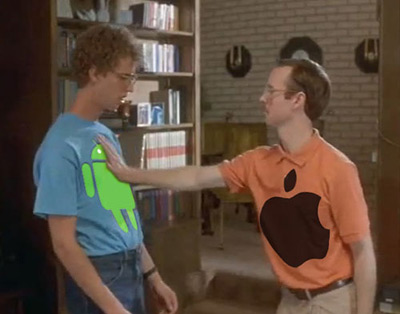
[Opinion] Android is better, and American startups need to realize that
One of the issues with writing opinion posts on a site like Phandroid is that nobody outside the community takes you too seriously. “You’re just a fanboy” is the usual reception I would receive, without paying attention to the argument I had made.
When Twitter’s experience designer Paul Stamatiou wrote his now famous Android is better blog post, I was delighted for two reasons. One, of course, is how much attention it got, which can only be good for the platform on the whole. Secondly, it felt like a personal victory to find someone like him using the same arguments I often use. Additionally, coming from a well-respected experience designer, it felt like an endorsement for what I wrote about a month ago in this post:
This culture, coupled with the openness of the Android platform, is why today I often recommend product designers and managers that I meet to switch to Android. Thanks to the work of apps covered in Uniquely Android, many of whom have seen their features being copied to the manufacturer ROMs, I believe that the User Experience we now get is far beyond anything possible anywhere else. Heck, even most iPhone fans seem to agree.
As an indie-developer, I often find myself thinking of experiences that I would never have even considered a year or so ago. Apps shouldn’t “just function”, as I thought before, but go deeper and really amaze the user.
But, as things are on the internet, every viral blog post spawns numerous others that try to poke some sort of holes in the first. While I typically try to ignore them, TechCrunch’s Startups Apparently do not care that Android is better was one that I couldn’t. To her credit, Sarah Perez did get most of her facts spot on (the only one that really caught my eye was the statement that Android has 800,000 apps, while in truth it had crossed 1 million over a month ago). Also, it should be noted that she wants to see more companies going Android-first, having often tried to quit the iPhone for a Nexus, only to be pulled back due to a lack of apps.
First, going right to the end of Sarah’s post and inspecting her list of iOS-only apps, I noticed that there were a lot more “apps” and few “startups” over there, and the distinction between the two is very important. That “few” is still a few too many in my eyes, but it’s important to accurately portray the picture, especially since a lot of those apps have Android equivalents in terms of capabilities, if not popularity.
What was the serious flaw with the post, though, was that Sarah’s definition of startups seemed to be limited to a bubble that only consists of America, which is common amongst those in Silicon Valley. Globally, however, the trend to me seems to be changing drastically. I am an Entrepreneur in Residence with India’s TLabs startup accelerator (run by Times of India, the country’s largest media network), and the entire batch are focused almost exclusively on Android. It’s quite obvious why they would: Android has 80% of the global smartphone sales.
And, I can’t emphasize this enough, ignore these global startups at your own risk. Innovation doesn’t exist in the US of A alone. more often we’re seeing great products from outside. And these companies are often healthier than their American counterparts, because they rarely get to implement a “we’ll generate revenue later” attitude like you get to in the US. The stickers that Path wants to make money from? That’s copied from the Japanese messaging app Line who made $17 million in the first quarter alone from them.
Sarah highlighted the benefits of going Android-first quite well, too. Besides the fact that more and more people are using Android, we have Google Play’s accelerating growth in terms of developer payouts and a greater chance to reach the top of the charts. Any.Do, for example, greatly used this lower competition to build a brand.
To those, I would add what is, in my opinion, the greatest advantage of all: alpha/beta testing from Google Play as well as being able to publish without needing an approval first. The first got HUGE cheers from the audience at Google I/O in May, while the second allows for very quick iteration. These companies need to build, measure and fix at a rate that Apple’s App Store restrictions simply does not allow.
So, if you’re an American startup, I can’t advise you enough to give Android a serious look. There isn’t one formula, as some might have you believe. Your choice depends on a several factors, such as the talent you have, the users you are targeting, the technology requirements for the platform, etc. If someone tells you that iOS is better, without giving any reasons, try to find out why. But, as a general rule, I would say that Android probably is.

